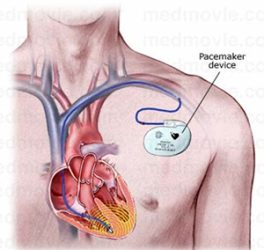 Over the years, humanity has invented numerous life-saving devices and equipment. One that immediately comes to mind is pacemaker. What a pacemaker does is essentially control your heartbeat. It is usually utilized for patients who have low heart beat or irregular heartbeat. A pacemaker comprises a small battery and electronic circuit that sends electrical pulses to the heart. This ensures that the heart can continue to function in an efficient manner.
Over the years, humanity has invented numerous life-saving devices and equipment. One that immediately comes to mind is pacemaker. What a pacemaker does is essentially control your heartbeat. It is usually utilized for patients who have low heart beat or irregular heartbeat. A pacemaker comprises a small battery and electronic circuit that sends electrical pulses to the heart. This ensures that the heart can continue to function in an efficient manner.
Normally, pacemakers are robust devices and rarely malfunction. But as they have electronic components, there’s always a risk of things going wrong. So, what will happen if the pacemaker suddenly malfunctions or stops working completely. What happens to the patient if pacemaker fails? How much time the patient has to get it fixed? For answers to such questions, here are some important things we need to know about pacemakers.
Pacemaker dysfunction symptoms
If you are not near a doctor, symptoms can help you identify if your pacemaker has malfunctioned or stopped working. When a pacemaker malfunctions, there could be symptoms like consistent slow heart rate. Or your heart could alternate between periods of slow heartbeats and fast heartbeats. Another symptom is irregular heartbeat. In general, you will experience weakness and tiredness if your pacemaker is not working properly.
How much time you have after pacemaker malfunctions?
The seriousness of symptoms may vary from patient to patient. For some, the symptoms may be mild to moderate. For others, a malfunctioning pacemaker can lead to more serious outcomes such as fainting, difficulty in breathing, chest pain, vomiting, nausea, and extreme drowsiness. Fatality related to pacemaker malfunction is unlikely provided that you get medical help as soon as possible. If symptoms are ignored over longer durations, there will be increased risk of serious heart related problems.
Can you die if pacemaker stops working?
Although rare, there is possibility of death due to pacemaker malfunction. It will depend on the condition that has necessitated the use of a pacemaker. For example, the risk is high in patients diagnosed with infrahisian AV block. If the pacemaker of such a patient malfunctions, it could result in fatality.
Modern day pacemakers are highly reliable and very rarely fail or malfunction. To reduce risks even further, it’s imperative that you get the pacemaker tested at regular intervals. This will ensure that any potential problems with the pacemaker can be identified at an early stage.
A number of problems associated with pacemakers can be identified and fixed. It includes things like battery depletion, electronic circuit failure, and dislodged pacemaker lead. It is possible that the condition of your heart may have also changed. In this case, the pacemaker will need to be reprogrammed.
 Newspatrolling.com News cum Content Syndication Portal Online
Newspatrolling.com News cum Content Syndication Portal Online







